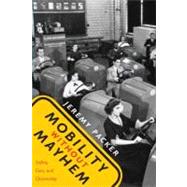Mobility without Mayhem
, by Packer, Jeremy- ISBN: 9780822339526 | 0822339528
- Cover: Hardcover
- Copyright: 3/30/2008
While Americans prize the ability to get behind the wheel and hit the open road, they have not always agreed on what constitutes safe, decorous driving or who is capable of it.Mobility without Mayhemis a lively cultural history of Americars"s fear of and fascination with driving, from the mid-twentieth century to the present. Jeremy Packer analyzes how driving has been understood by experts, imagined by citizens, regulated by traffic laws, governed through education and propaganda, and represented in films, television, magazines, and newspapers. Whether considering motorcycles as symbols of rebellion and angst, or the role of CB radio in regulating driving and in truckersrs" evasions of those regulations, Packer shows that ideas about safe versus risky driving often have had less to do with real dangers than with driversrs" identities.Packer focuses on cultural figures that have been singled out as particularly dangerous. Women drivers, hot-rodders, bikers, hitchhikers, truckers, those who "drive while black," and road ragers have all been targets of fear. As Packer debunks claims about the dangers posed by each figure, he exposes biases against marginalized populations, anxieties about social change, and commercial and political desires to profit by fomenting fear. Certain populations have been labeled as dangerous or deviant, he argues, to legitimize monitoring and regulation and, ultimately, to curtail access to automotive mobility. Packer reveals how the boundary between personal freedom and social constraint is continually renegotiated in discussions about safe, proper driving.







